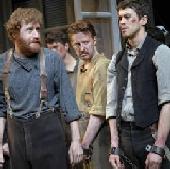SITE GUIDE
SEARCH
REVIEWS
FEATURES
NEWS
Etcetera and
Short Term Listings
LISTINGS
Broadway
Off-Broadway
NYC Restaurants
BOOKS and CDs
OTHER PLACES
Berkshires
London
California
DC
Philadelphia
Elsewhere
QUOTES
On TKTS
PLAYWRIGHTS' ALBUMS
LETTERS TO EDITOR
FILM
LINKS
MISCELLANEOUS
Free Updates
Masthead
Writing for Us
A CurtainUp  London Review
London Review
 London Review
London ReviewEnemies
|
Pamphlets are flying and there's a very distinct smell of socialism in the air!
---- Michail |

Scene from Enemies
(Photo: Hugo Glendinning) |
Written in 1907, this play narrowly precedes the Russian revolution, and fills the gap in the history of Russian society between Chekhov's world of aristocratic ennui and offstage, downtrodden serfs and the revolution. Gorky's workers are articulate and intelligent, although they feel the pinch of the "dirty rouble". They also observe the bourgeoisie with calm perspective, aware that Russia is on the brink of immense social upheaval.
The scene is set in an idyllic garden of a manor house in an unnamed Russian town. Zakhar Bardin (Sean Chapman) is the well-meaning but bumbling owner trying to control his property and remain a popular figure. He is joined by his conservative wife Polina (Amanda Root), his drunken layabout brother Yakov (Jack Davenport) and his impetuously innocent sister Nadya (Jodie Whittaker). The family's nearby factory is full of disaffected workers, threatening to strike and disrupt the scene's tranquillity. Added to this are a hated, draconian factory-master Michail Skrobotov (Sean Gilder), his officious wife Kleopatra (Robin Weaver) and his severe brother, a public prosecutor Nikolai (Stepen Noonan). When Michail proposes to close the factory to force the workers into submission, violence breaks out, followed by escalating conspiracy suspicions as the bourgeoisie feel Socialism surrounding them.
One of this play's great strength is Gorky's ambivalent attitude to both sides. Neither is perfect but the flaws of the rich are shown to lead to ultimate self-destruction. As the worker Levshin (Edward Peel) tells Nadya "We're not your enemies, you are!" Gorky's insight into human character crosses social boundaries and the play is full of brightly realised, convincing characters from both sides of the community. This is especially rare in so large an ensemble.
The fact that the level of acting is uniformly superb also adds to the outstanding characterisation. Stephen Noonan is a revelation as the supremely intense Nikolai Skrobotov whose persecution of the so-called Socialists conflicts with his temptation: the beautiful actress Tatyana, Yakov's wife (Amanda Drew). She skilfully navigates the role of Tatyana from an ambiguous character to one with integrity and perspective. Jack Davenport is better than I have ever seen him as the scruffy, drunken, yet genuine Yakov.
The first act opens in a beautifully designed garden, where stage entrances are concealed among the forest background. The tall silver birches onstage snake upwards through the theatre's lighting equipment. In many ways, it seems a classic Chekhovian scene, with a steaming samovar, black bread and vodka laid out on the table. The second half, however, reveals the disruption to society. Moving inside the house, the tall, misted French windows are surrounded by troops and their prisoners while an atmospheric thunderstorm rages.
Part of the production's success is undoubtedly due to David Hare's simple and straightforward new translation. It captures the urgent yet naturalistic dialogue. Hare my have diminished the dialectic differences between the social classes which is in the original, but the uncontrived result is worth this sacrifice.
Michael Attenborough demonstrates two rare directorial abilities: he gets precisely flawless performances from his cast and maintains the production's overall integrity and momentum. In a play with so many disparate characters and a potentially messy, superficial nexus of relations, this is no mean achievement.
|
ENEMIES
Written by Maxim Gorky Translated by David Hare from a literal translation by Charlotte Pyke Directed by Michael Attenborough With: Sean Chapman, Amanda Root, Jack Davenport, Amanda Drew, Jodie Whittaker, Patrick Godfrey, Sean Gilder, Robin Weaver, Stephen Noonan, Graham Turner, John Benfield, Sandra Voe, Toby Kebbell, John Higgins, Edward Peel, Tony Turner, Matthew Wilson, Martin Barron, Deka Walmsley, Glynn Sweet Design: Simon Higlett Lighting Design: Tim Mitchell Sound: Paul Arditti Running time: Two hours 20 minutes with an interval Box Office: 020 7359 4404 Booking to 24th June 2006 Reviewed by Charlotte Loveridge on 12th May 2006 performance at Almeida Theatre, Upper Street, London N1 (Tube: Angel Islington) |




